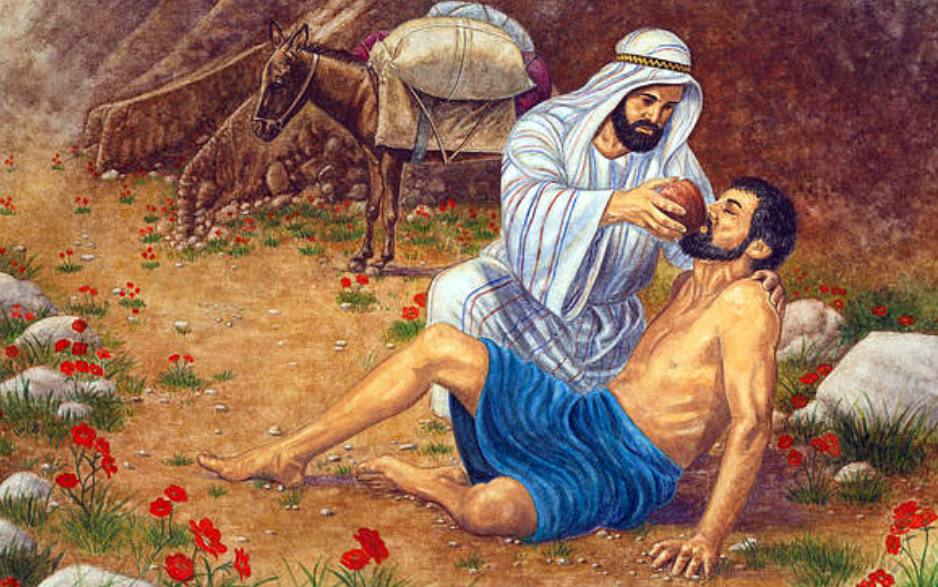Lk 10:25-37
Dtn 30:10-14
Col 1:15-20
focus: Today’s gospel invites us to respond to God’s love with ours – to God and to our neighbors, the close ones and the more remote ones as well!
The evangelist Luke relates to us some of Jesus’ most famous stories. Today we heard one of them, the Parable of the Good Samaritan. We are very familiar with it. However, this can prevent us from fully appreciating its provocative message.
Our gospel today begins with a scholar of the law (that is, a Scripture expert) approaching Jesus in order to “test” him. He asks Jesus what he must do to inherit eternal life. Jesus throws the question back at him: “What does the Bible say?” The scholar answers by combining two texts: “You shall love the Lord, your God, with your whole being” (Deuteron. 6:5) and “[You shall love] your neighbor as yourself.” (Leviticus 19:9). Jesus wholeheartedly approves of this answer.
In fact, the heart of Jesus’ own teaching is expressed in these words. God has loved us into being and showers us with gifts. Our first love, in return belongs to God: with heart, mind, strength and our entire being. Second, love of God is closely connected with love for all God loves: all human beings
and all creation. In fact: Love for God is expressed through love of one’s neighbor as especially Luke’s Gospel makes clear.
“And who is my neighbor,” the Scribe asks. Jesus, in response, tells the Parable, challenging the scholar, and us, not to limit too narrowly our notion of “neighbor!” The road from Jerusalem to Jericho, as Jesus’ listeners knew, was very dangerous. It was filled with bandits. Using it was unsafe, especially for one who traveled alone. It was one such traveler whom Jesus describes as being beaten, robbed and left for dead.
The first two people who come across the dying man are religious professionals, a priest and a levite (an altar server of sorts). However, they, concerned about their own safety and about maintaining ritual purity, don’t take action to help the dying man. Jesus’ listeners must have been surprised at the inaction of the priest and the levite!
What follows in the story is even more shocking. There was a centuries old antipathy between Jews and Samaritans. In response to a supposedly pious Jew’s question Jesus makes a Samaritan, not an Israelite, the hero of the story! The Samaritan reacts with compassion upon seeing the beaten man,
binding his wounds and seeing to his care and recovery. The story illustrates dramatically how love for God is empty if it is not expressed in real concern for others. Jesus describes how true love is to be expressed and how we are to regard those most in need, even strangers, as our neighbors. Plus, he shatters his listeners’ prejudices that limited their ability to see goodness in people different from them.
Today’s first reading from the Book of Deuteronomy underlines this point by saying what is really important to God is not too mysterious, not difficult to understand. What is necessary for us is to know God’s commandment, having it on our minds and in our hearts and to carry it out, to put it into practice!
In today’s second reading St. Paul points us to Jesus in whom the fullness of God “was pleased to dwell.” He combined perfectly and to the full in himself the two dimensions of love for God and love for neighbor. He lived in union with God. And he himself as it were became the Good Samaritan, making God’s care for all, especially for those most in need, visible even to the end, when he shed his blood on the cross.
Sisters and brothers, Today’s gospel invites us to respond to God’s love with ours – with love to God and to our neighbors, the close ones and the more remote ones as well! Loving God first means making regular contact with God in prayer a priority: Personal prayer, reading Holy Scripture prayerfully, attending communal worship, Adoration. God loves us the way we are, we can bring to God in prayer everything that is going on in our life. God’s compassion can reach us even where we are wounded – like the Samaritan’s love reached the man on the road!
On the other hand, our love and concern for other people must grow in its quality and in its reach, toward wherever we find someone who resembles the victimized traveler in the story.
We also must think globally. The U.S. Administration has issued a rescissions package to cancel funds Congress already approved for programs that respond to major emergencies around the world and that help children, families and communities. Countless human lives are at risk. Adjustments are still being made in the US senate till July 18, and we can express to our senators that this is important to us! We are called to such action, too, because, as Pope Francis expressed it in the title of his last encyclical, we, people everywhere around the world, are Fratelli Tutti, Brothers and Sisters All.
AMEN.
~Fr. Thomas Leitner, OSB

